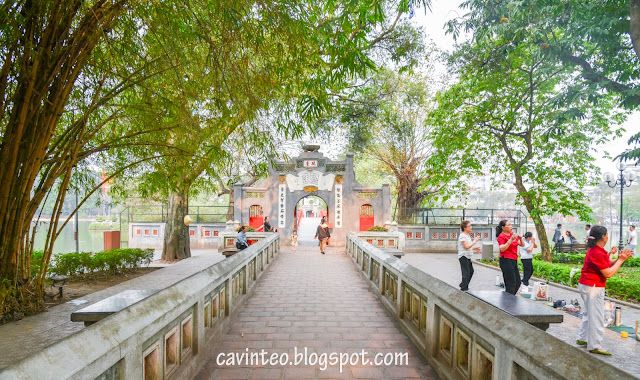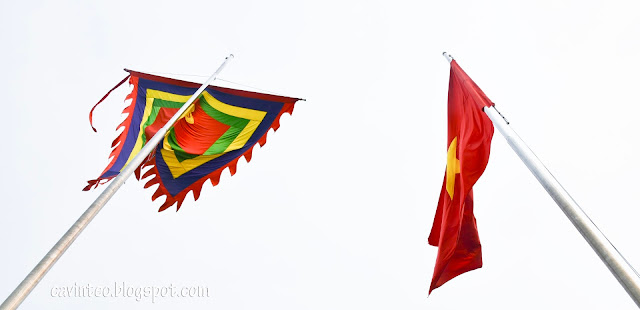Seven days in Hanoi and I finally got around to check out this temple that I walked past, jogged past on a daily basic; Ngoc Son Temple, also known as the Temple of the Jade Mountain. p.s. located on an small islet, not a mountain.
Main ritual gate; which was opened to the public. The temple was located within Hoan Kiem Lake Park and this was one of my touch points for my almost daily jog.
Pen Tower - said to be 28 meters tall and built on a stone hill with a stone feather topping the tower, I am skeptical about its height as 28 meters would be about 10 floors high and it honestly didn't look that tall.
An altar for the mountain god, despite the lack of a mountain / hill! Although the altar wasn't that accessible (required a climb), it appeared to be "serviced" with display of fresh fruits, lighted incense sticks and candles.
Tickets for entry to Ngoc Son Temple!
Adult: 30,000 Dong (less than S$2.00)
The tiger board and the dragon door - both signified a successful examination but I think students would likely prefer to secure the blessing from the ancient Temple of Literature instead.
Rules for Ngoc Son Temple.
Still within public space; with a group of Vietnamese aunties exercising on the side. From my past few days experiences, line dancing appeared to be real popular.
Dai Nghien Gate - aside from being the admission gate, an interesting feature was the ink slab on top! It was said that "on the morning of the 5th day of the 5th lunar month, when the sun rises, the stone feather pen atop the Pen Tower will cast its shadow over this ink pot."
The Huc Bridge - first built in 1865, the icon of Hoan Kiem Lake was rebuilt twice, with the latest being 1952 when the foundation was changed from the flammable wood to cement.
More photos, including a good view of the Turtle Tower.
Dac Nguyet Lau Gate - while the name was indicated as "Moon Gazing Pavilion", direct translation was getting the moon building and relates to humans' desire to own the moon.
Basic information of the century old temple, built in 1841, can be found on the red information panel on the right, once you step beyond Dac Nguyet Lau Gate.
Let's follow the directions!
I honestly thought this was the burner for paper money; however, the Chinese characters translate to respect the words pavilion, which don't make sense.
Tran Ba Pavilion - I am scratching my head as I read the explanation for its objective; "built to function as a steady shield against evil cultural influences in the feudal period". Not sure how is that reasonably possible?
Guess it's more symbolic as the name of the pavilion was said to mean the pavilion against waves and I guess it can be bad waves like wars, bad leaders, evil cultural influences etc. A unique physical feature was that the pavilion was supported by eight beams; four wooden, four stone, with words engraved on the stone ones.
Pavilion overlooked the Hoan Kiem Lake, including the turtle tower. I am wondering if the legendary turtles, if there are still any, would climb up to the concrete slab late at night.
In front of the Tran Ba Pavilion were also two huge flags; one showing the Vietnamese national flag and the other being a religious flag that had the Chinese character "god" in the middle.
Main temple building; said to honor the three sages of Taoism and also a Vietnamese national hero. For the three sages, they were Wenchang Dijun, Guan Yu and Lü Dongbin although my understanding for the three sages is another group of deities.
Domineering incense stick holder. One thing I noticed was that the incense sticks differed from the ones we used in Singapore; the Vietnamese ones seemed to curl after burning.
Despite my understanding of the Chinese characters, I don't understand their poetic and idiomatic reference. I did know that the god for the second picture was Wenchang Dijun; God of Culture and Literature.
Deeper section within.
This seemed to be the Vietnamese national hero; Trần Hưng Đạo who was remembered as the man who "commanded the Vietnamese armies that repelled two out of three major Mongol invasions in late 13th century".
Red character means loyalty in Chinese.
Beer used as offerings. Unlike many religions, alcohol is an accepted offering for Taoism and it can be an elaborate display of food and drinks, with roasted pigs, ducks, chicken etc, aside from the typical fruits.
A side store that sells the offerings, including flowers and souvenirs.
These golden turtles depicted the legend of Hoan Kiem Lake, where a turtle requested the king then to return the magic sword that was said to help the king repel the enemies.
Design of the turtles was based on the two specimens of the softshell turtles found dead at Hoan Kiem Lake. Please check out the posting here for more photos!
An important photo - evidence of the dead turtle found at the Turtle Tower of Hoan Kiem Lake back in 2016. It was largely believed that the turtle is now extinct at the lake but who knows right?
Vietnamese calligraphy, for a fee!
Similar to Temple of Literature!
I am wondering if the drinks were for free... At my age, I would go for my daily coffee with sugar but most of the times, I would drink plain water or beverage without sugar. Anyway, there didn't seem to be any cups for me to use.
The official paper money burner. I am actually quite obsessed with fire and when it comes to temple visitations, I used to volunteer to burn the paper money!
Random photos of the temple before we end the post.
Final few photographs of The Huc Bridge; to be honest, I would have assumed the vermilion-red bridge was made of wooden foundations, instead of cement! Spanning 45 meters long and 2.6 meters wide, it had 16 pairs of cemented columns with 15 spans.
The End.
=====
P. Đinh Tiên Hoàng, Hàng Trống,
Hoàn Kiếm, Hà Nội 100000, Vietnam
Map
As above.
Operating Hours
Mondays to Thursdays - 7.00 am to 6.00 pm
Fridays to Sundays - 7.00 am to 7.30 pm
Pricing
Adult - 30,000 Vietnamese Dong
Student - 15,000 Vietnamese Dong
Below 15 Years Old - Free
























































No comments:
Post a Comment